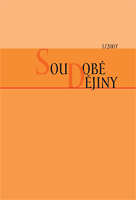Úvahy nad biografiemi Emila Háchy
Some Thoughts on the Biographies of Emil Hácha
Author(s): Jan Kuklík, Jan GebhartSubject(s): History
Published by: AV ČR - Akademie věd České republiky - Ústav pro soudobé dějiny
Summary/Abstract: The authors consider the historical role of Emil Hácha (1872–1945), the President of the Second Republic of Czechoslovakia (which lasted for the six months from the Munich Agreement of late September 1938 to the German Occupation of mid-March 1939) and in the Protectorate of Bohemia and Moravia (from mid-March 1939 to early May 1945). They compare and assess the four biographies of Hácha published since the collapse of Communism: Dušan Tomášek and Robert Kvaček’s Causa Emil Hácha (Prague, 1995), Tomáš Pasák’s JUDr. Emil Hácha (Prague, 1997), Vít Machálek’s Prezident v zajetí: Život, činy a kříž Emila Háchy (Prague, 1998), and a new, expanded edition of Pasák’s work, with the title Emil Hácha (1938–1945). Gebhart and Kuklík note that all four authors use similar basic sources and, logically, concentrate mainly on Hácha as President. They differ, however, in their emphasis on various events and in their interpretations. They argue that the most critical are Kvaček and Tomášek, whereas Pasák is positivist and neutral. Machálek, on the other hand, is, according to them, almost an apologist, having selected his sources to suit the image of Hácha he wishes to portray; compared to the other three writers, he devotes the most attention to Hácha’s childhood and youth and also to the posthumous dispute often called the “Hácha case” (causa Emil Hácha). A weakness shared by all these works, according to Gebhart and Kuklík, is their failure to use records related to the development of the attitude of the resistance at home and abroad towards Hácha. Gebhart and Kuklík discuss important points in Hácha’s career – from his becoming president (elected by the parliament in 1938) to his death in prison after the war, and they consider the trial that was being prepared for him. Without doubting the sincerity of his patriotism, they argue that Hácha’s career was as a downward development from a state representative endeavouring to preserve his country’s legal continuity with the pre-war period to a passive object of manipulation by the German occupying forces and the people around him. In conclusion they state that this tragic political fate will surely continue to attract the attention of historians, as was demonstrated, for instance, by “The Case of Emil Hácha,” a seminar held by the Institute of Contemporary History and the Masaryk Institute, Prague, in June 2005.
Journal: Soudobé Dějiny
- Issue Year: XIV/2007
- Issue No: 04
- Page Range: 806-818
- Page Count: 13
- Language: Czech

